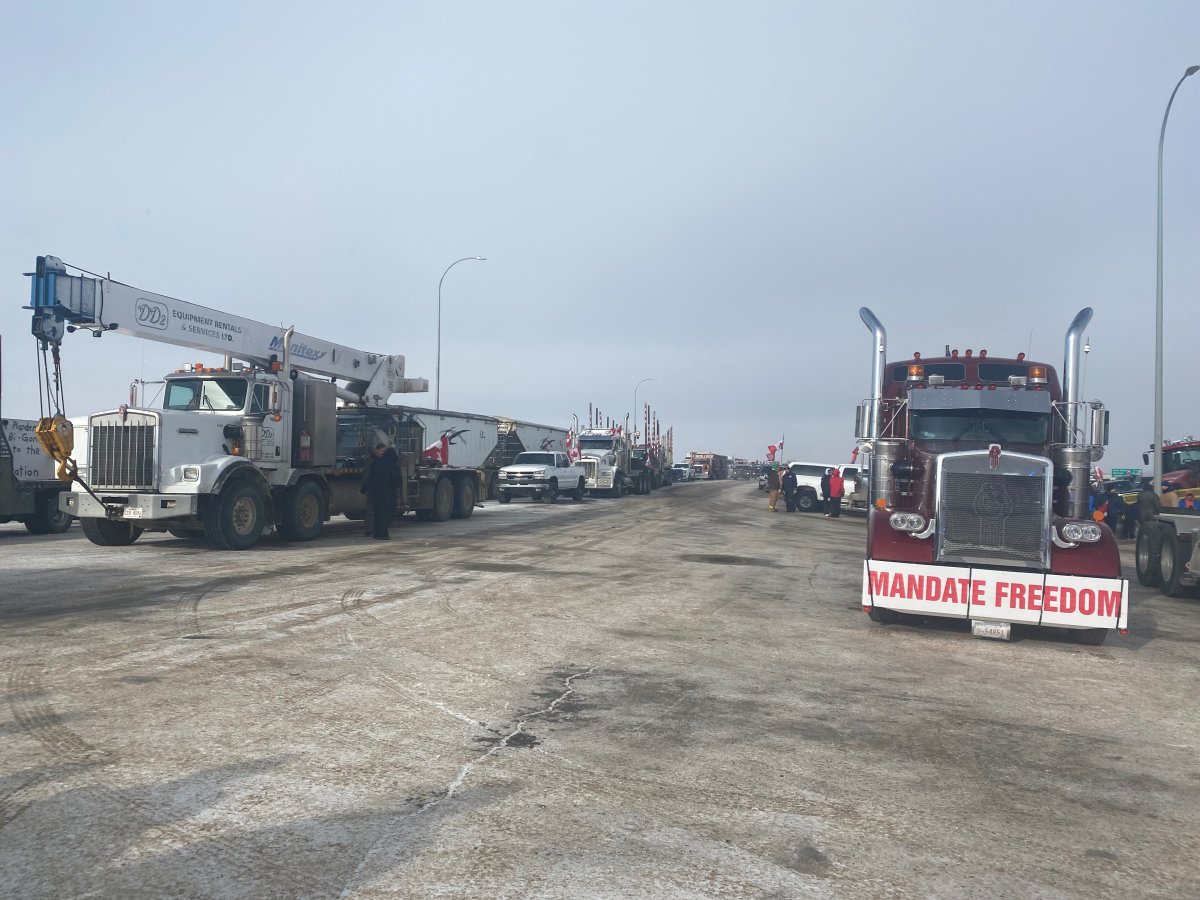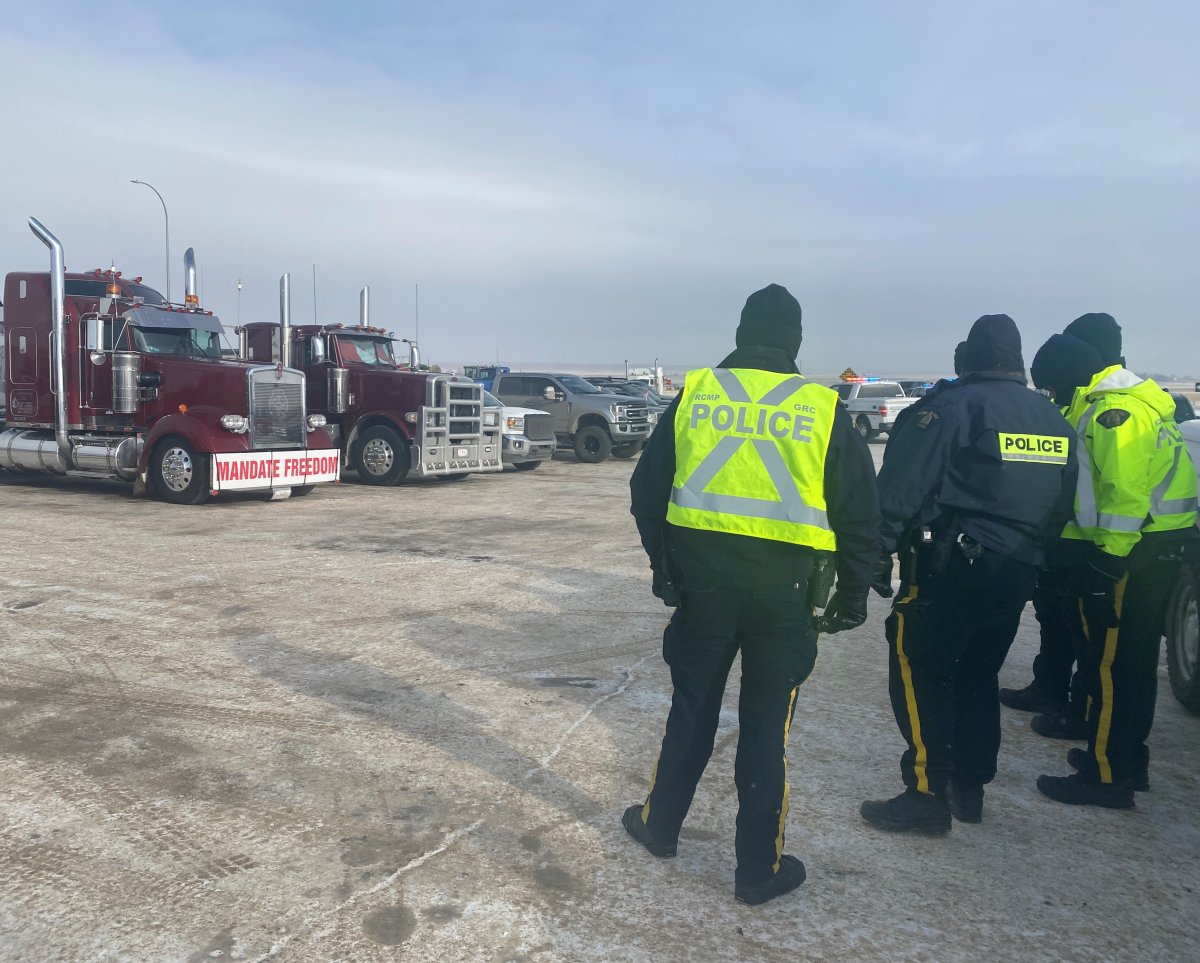An Alberta First Nation believes the Critical Infrastructure Defence Act is being applied differently to non-Indigenous protests than it is to Indigenous protests.

In a statement, the Athabasca Chipewyan First Nation chief and council said if the Coutts protest was organized by Indigenous people, authorities would have responded quickly to remove it.
“Over the past several days we have watched in dismay as the border blockade at Coutts, Alta., is allowed to continue without intervention from authorities.”
Demonstrators began parking their vehicles and blocked the highway between southern Alberta and the United States on Saturday in solidarity with similar events in Ottawa and countrywide — to protest COVID-19 vaccine mandates and broader public health measures.
The tie-up stranded travellers and cross-border truckers for days, compromising millions of dollars in trade and impeding access to basic goods and medical services for area residents.

Police tried to peacefully break up the demonstration Tuesday, only to see others breach a nearby police barricade and join the blockade.
Chad Williamson, a lawyer representing truckers blocking access to the border crossing, said Wednesday afternoon they spoke with Mounties and agreed to open some blocked lanes.
However, on Thursday, a second protest on Highway 4 about 20 kilometres north of Coutts choked off traffic, RCMP said.
The Canada Border Services Agency (CBSA) said that at about 12 p.m. Thursday, officers were able to resume processing travellers entering Canada at the Coutts border “after highway access was restored north of the border crossing.
“Travellers at Coutts should still expect significant delays due to the backlog of vehicles from the past six days that are now attempting to enter Canada,” CBSA said.
“The Critical Infrastructure Defence Act, passed in 2020, was created in response to Indigenous railway blockades protesting pipeline developments on Indigenous territories,” the Athabasca Chipewyan First Nation statement said Wednesday.
“This law was used to end Indigenous blockades — so the question that must be asked is: Why the blockade at Coutts is allowed to continue?”
Alberta’s Bill 1 – the Critical Infrastructure Defence Act – passed third reading in the legislature at the end of May 2020.
Bill 1 was introduced at the beginning of the session and at the height of the rail and road blockades across the country in solidarity with the Wet’suwet’en hereditary chiefs, who were protesting the construction of the Coastal Gas Link natural gas pipeline in northern British Columbia.
The legislation prohibits any person or company from blocking, obstructing construction or maintenance, damaging, or entering a place deemed essential infrastructure without lawful right.
The extensive list of sites to be deemed essential infrastructure includes highways, pipelines, railways, oil and gas sites, electrical and power plants, telecommunications equipment, radio towers, farms, dams and electrical lines on public or private land.
Those violating the law can be fined up to $25,000 or face six months in jail, while corporations found in violation could see fines up to $200,000.
According to the legislation, each day a site is blocked or damaged is considered a new offence.
“In Coutts, we see the inequities in our country when it comes to Indigenous people and methods used to control our rights to peaceful protest,” a statement from the Athabasca Chipewyan First Nation said.
“If the blockade in Coutts consisted of Indigenous people, there would have been arrests and charges laid; instead, the Coutts blockade is being allowed to continue, even though it has at times become violent. We do not condone or encourage violence in any manner.
“It is important to recognize the disparity between how Indigenous and non-Indigenous protests are approached by our government. It is shocking to see this blatant disparity as we watch the complete government inaction to address the blockade at Coutts.
“If peaceful protests of critical infrastructure at Coutts is allowed, then we expect the same to be true in the future should Indigenous people engage in similar forms of protest,” the First Nation’s statement concluded.

In June 2020, a group of law professors at the University of Calgary analyzed the legislation and said it violates the Charter of Rights and Freedoms. Jennifer Koshan was part of that group.
“We also made the argument that CIDA — or Bill 1 — might have an adverse impact on marginalized groups. The last argument was based on our reading of the legislative debate at the time of Bill 1, which indicated the bill was aimed at some of the protests that Indigenous peoples had engaged in around pipeline construction,” she told Global News on Thursday.
The Athabasca Chipewyan First Nation raises an interesting question, Koshan said.
“People were worried about the chilling affect CIDA was going to have on Indigenous peoples, on environmental protesters, on labour unions, but it’s interesting that no charges have been laid on any groups since Bill 1 came into effect.
“It certainly seems like the actions of the truckers and the other people engaged in the blockade in Coutts fall within the scope of the CIDA, so it is a fair question to ask why the act is not being used in these circumstances.”
Allan Adam, chief of the Athabasca Chipewyan First Nation, told Global News he’d like to see Bill 1 scrapped if it’s not going to be enforced equally.
“If it only applies to certain people — First Nations — there’s no use for it. It only brings tension and we don’t want tension anymore. We just want to work and get along and get through this pandemic.
“We don’t need a bill that’s going to be racially profiled to First Nations people,” Adams said.
He said he thought Bill 1 was supposed to prevent critical infrastructure — like highways allowing trade, goods and transport between Canada and the U.S. — from being blocked.
“Why is it not being applied here? What is this bill really about?
“When railroads and everything — major infrastructure — is being halted by First Nations, you know right away authorities are there within a heartbeat. They’ll start making arrests if they have to,” Adams said.
“It doesn’t do any good for Albertans alike if it’s only going to be focused on one certain group of people.”
Adams said he supports truckers having a voice and thanks them for their work but says it’s time to “get back to business.”

Lee Crowchild, former chief of the Tsuut’ina First Nation, agrees this is an example of inequality.
“In the end, it boils down to the colour of your skin.”
When asked about the response of law enforcement and absence of arrests at the Coutts border and in Milk River, Crowchild said: “They don’t know what to do because these aren’t terrorists; these are our neighbors and friends and: ‘These people are the same colour as me. They are white. Why would I want to impose that on my own?'”
Bill 1 was introduced prior to the pandemic, Koshan pointed out. Since then, there’s been a number of rallies and protests.
“We’ve seen anti-vaccine and anti-mask protests in the streets of cities and towns across Alberta and some of those protests may have also engaged the Critical Infrastructure Defence Act but we didn’t see any charges in relation to those protests either,” she said.
“It does make a person question who the act was intended to be aimed at.”
When Koshan and her colleagues initially raised concerns with the bill back in 2020, they were worried CIDA could be used disproportionately against Indigenous protesters, unions and Black Lives Matter protestors, for instance.
“With the pandemic, we’ve seen a whole new range of protests occurring by people from perhaps a different part of the political spectrum. I think it’s very interesting that Bill 1 has not been used, at least to our knowledge, against any of those protesters whose politics may align, in some ways, more closely with those of the current government,” Koshan said.
“Bill 1 was enacted in a particular political context — at the time of Indigenous pipeline protests — and that history of the bill does seem to have an influence on how it’s being enforced.”
Temitope Oriola, a criminologist at the University of Alberta, said there seems to be “a level of paralysis when it comes to enforcing the law with respect to right-wing groups.”
“There is a tendency to view protests by right wing groups as mere social nuisances rather than criminality and the ongoing showdown at various border crossings is evidence of the reluctance to deploy enforcement.”
Different groups have different levels of power, status and capital, Oriola added.
“Groups protesting a pipeline didn’t have level of political capital these protestors have… These groups have a level of political capital and tend to be economically well-resourced. The current group across the country has managed to raise at least $6 million,” Oriola said.
“This is not a policing matter; this is a political matter and the willingness from political leaders from the federal level to say officers should move in.”
When reached for comment, a spokesperson for Alberta Justice asked Global News to direct questions to the RCMP, “as the government does not direct the actions of the police or enforcement of the law.”
Global News has reached out to Alberta RCMP for a response to the Athabasca Chipewyan First Nation’s statement but has yet to receive a reply.
If comment is received, this article will updated to include it.
A spokesperson for the Alberta ministry of Indigenous Relations sent a statement to Global News:
“Alberta’s government is committed to true and meaningful reconciliation. We recognize there is frustration regarding the recent blockades.
Indigenous Relations and government as a whole is continually working against racism to ensure people are treated fairly and improving outcomes for Indigenous Peoples, communities and organizations.
“Alberta’s government is committed to learning from Indigenous communities, strengthening relationships and working together to resolve issues and move forward on the shared path to reconciliation.”
On Tuesday, the fourth day of the Coutts protest, the Alberta RCMP said: “What may have begun as a peaceful assembly quickly turned into an unlawful blockade. While the Alberta RCMP has been in a position to conduct enforcement, we have been engaged with protesters at the Coutts border crossing in an effort to find a peaceful and safe resolution for all involved. We thought we had a path to resolution, the protesters eventually chose not to comply.”
The news release said “further action” was being taken by the RCMP Tuesday “as this blockade continues to impede the ability for emergency agencies to provide full services to area residents. It has also negatively impacted the flow of goods and services, and impedes the public’s freedom of movement.”
The RCMP news release referenced a highway being considered essential infrastructure under the Critical Infrastructure Defense Act.
“It is unlawful to wilfully obstruct, interrupt or interfere with the construction, maintenance, use or operation of any essential infrastructure in a manner that renders the essential infrastructure dangerous, useless, inoperative or ineffective.”
The RCMP said violators can be arrested or charged under Bill 1 and could also “expect enforcement of any contraventions of the Criminal Code of Canada, the Traffic Safety Act and Use of Highway and Rules of the Road Regulations.”
While RCMP specified Tuesday that “this is not peaceful assembly,” on Wednesday afternoon they acknowledged two lanes of Highway 4 were reopened — one north and one south — because the participants in the blockade decided to.
The RCMP said they have “been actively engaging with participants of the blockade to re-open lanes of traffic” since the start of the demonstration.
As of early Thursday afternoon, RCMP said no arrests had been made nor charges laid.

— With files from Jill Croteau, Adam MacVicar and Phil Heidenreich, Global News; Dean Bennett, The Canadian Press









Comments